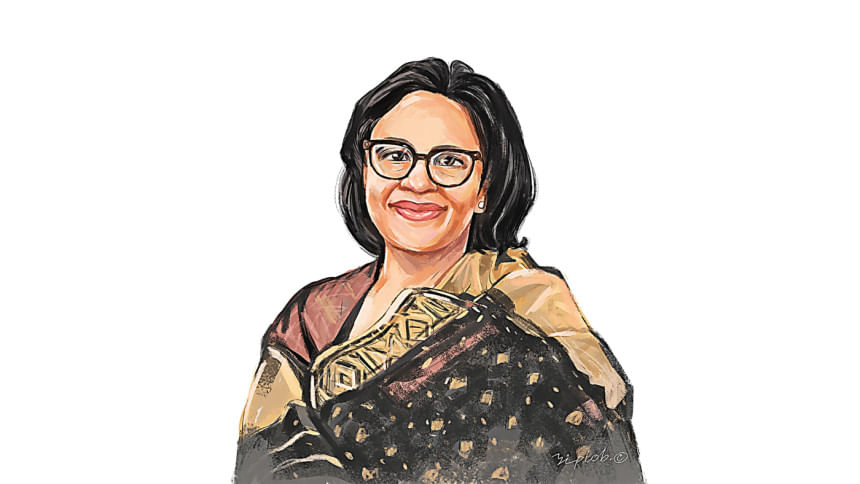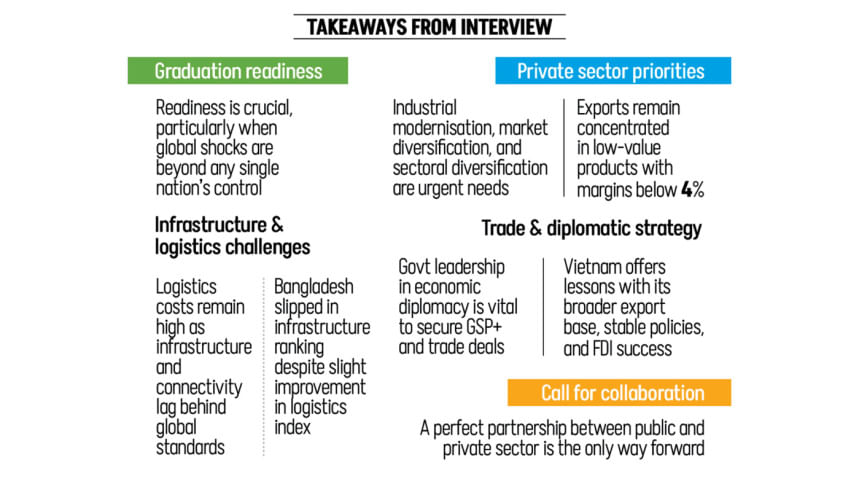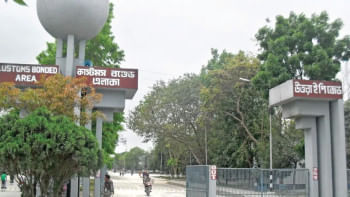LDC graduation: Leveraging deferment for a stronger future

Ahead of the country's scheduled graduation from the least developed country (LDC) category in November next year, former BGMEA president Rubana Huq says Bangladesh needs at least another five years to prepare for the transition.
Despite progress over the past two decades, Huq argued that the country has yet to resolve long-standing challenges in logistics, industrial modernisation and market diversification.
"Criticism often falls on the private sector for not preparing adequately, but serious shortcomings remain in infrastructure and connectivity," she said.
Huq was the first woman to serve as president of the Bangladesh Garment Manufacturers and Exporters Association (BGMEA), holding office from 2019 to 2021.
In an interview with The Daily Star, she pointed to the World Bank's Logistics Performance Index, where Bangladesh improved slightly from 100th to 88th place in the past seven years, while its infrastructure ranking slipped from 100th to 108th. Tracking and tracing fell from 79th to 105th.
"These figures raise legitimate concerns about rising logistics costs and the slow pace of customs and port modernisation, as well as the lack of meaningful progress in infrastructure and connectivity upgrades," said the former BGMEA president.
On the private sector side, she identified three urgent priorities. Those are industrial modernisation, market diversification and sectoral diversification.
Bangladesh, she said, holds little share in original design and brand manufacturing. Its exports remain concentrated in low-value products, with mark-ups usually below 4 percent. Reliance on labour-intensive output has created millions of jobs but kept productivity growth in check.
Huq said markets and product categories have stayed narrow. Ready-made garment exports to non-traditional destinations fell to 16.36 percent in 2024-25 from 17.10 percent in 2019-20.

Product diversification, she noted, improved only slightly, from 22.42 percent to 24.71 percent over the same period.
"In practice, Bangladesh's narrative of moving into higher value-added products has not yet convinced global buyers," Huq said. "What they look for instead is effective governance, and it is precisely this gap that has limited the country's ability to attract substantial FDI [foreign direct investment]."
She said it is not a question of blame. Rather, both the government and private sector should share responsibility and devise coordinated strategies for a sustainable graduation.
Huq said that discussions on deferment have been ongoing. "I trust that policymakers are fully aware of these deliberations and have taken them into consideration."
"As representatives of the private sector, we can only hope that the hard-won success in tariff negotiations with the United States will not be undermined by the loss of trade privileges that would negatively affect businesses," she commented.
Huq said no one wishes to remain under the LDC label indefinitely. However, readiness is crucial, particularly at a time when global shocks are unfolding beyond the control of any single nation.
She warned that the combined effects of Covid-19 and global instability could wipe more than $3 billion from exports. Meanwhile, Bangladesh's apparel competitors hold strong advantages.
"China enjoys Most Favoured Nation access. Turkey benefits from tariff and quota-free access to the EU customs union, while Vietnam already has a free-trade agreement (FTA) with the EU."
In such circumstances, she asked why Bangladesh should risk potential failure when seeking deferment through the UN and preparing for GSP+ with the EU would provide the breathing space the country deserves.
She emphasised the need for government leadership in economic diplomacy. "The immediate priority is to engage with the EU on the changes to its GSP scheme."
According to her, about $20 billion of exports now enjoy duty-free entry to the EU. Graduation would jeopardise this, since GSP+ requires compliance with double transformation rules of origin rather than the single transformation allowed under the Everything but Arms (EBA) scheme.
Meeting these rules will demand major investment in synthetic and functional fibres, as well as stronger backward linkages, said the former BGMEA president.
Huq said government backing will be vital, with policies to encourage man-made fibre production, promote FDI, manage the exchange rate, and pursue regional and bilateral trade deals.
She called for bilateral FTA talks with the EU and other trading partners, and for joint ventures in diversified fibre-based industries to reduce risks.
Vietnam offers lessons, she said, with its broader export base, stable macroeconomic policies, and success in attracting FDI since its Doi Moi reforms.
"Bangladesh must design a comparable national export and industrial strategy to achieve similar diversification."
She said an effective public-private working group should run continuously to address GSP+ requirements, monitor compliance, and propose adjustments to the policy framework.
She also urged the government to request extended cumulation with regional partners to tackle the double transformation hurdle.
Premature termination of EBA, Huq argued, without recognising Bangladesh's vulnerabilities, would contradict the EU's founding principles.
She contrasted Bangladesh's export scale with Nepal and Laos, whose far smaller economies rely heavily on remittances or tourism.
"With a significantly larger population, far greater export volume, and a deeply integrated role in global supply chains, Bangladesh's context and challenges are of an entirely different order," she said.
She said that Myanmar and Timor-Leste have delayed their graduations, while Angola has deferred multiple times. "Precedents for deferment do exist," she said.
After the graduation, Huq said there would be tariff shocks across the sectors.
She said leather, footwear, frozen fish, agro-processed goods and home textiles would face duties of 8 to 15 percent, while jute products could face 3 to 6 percent. Pharmaceuticals would lose TRIPS flexibilities, and ICT services would suffer preference erosion.
Emerging sectors such as light machinery, bicycles and electronics could struggle to compete with Vietnam, Cambodia and China, which enjoy stronger FTAs and better logistics.
About new work orders after the new US tariffs, she said, "It is still too early to make a definitive comment."
"While inquiries are coming in, actual order placements have yet to materialise, as brands and retailers remain cautious."
She welcomed the government's role in tariff talks. "Through active government negotiations, the 35 percent additive was successfully reduced to 20 percent," she said.
Urging unity, she said, "A perfect partnership between the public and private sector. The country needs to come together and rise above biases. Not all business people are thieves or culprits."
"Businesses may fail or face challenges, but as long as there is courage and aspiration to overcome them all, the private sector will rise. But without policy support and constant negative rhetoric, the entrepreneurs will feel abandoned and will shy away from investments."
"Tough times call for collaboration and vision. Bangladesh is on the edge; either we grow wings and soar to the next level or we take a leap of faith and perish," she concluded.

 For all latest news, follow The Daily Star's Google News channel.
For all latest news, follow The Daily Star's Google News channel. 



Comments